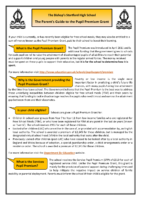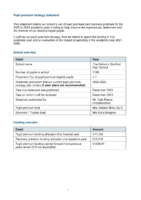Pupil Premium Statement
The Pupil Premium is allocated to schools based on the number of Children Looked After (CLA including those who have been looked after for 6 months or more) and for students who are eligible for free school meals (FSM; or who have been at any point in the last 6 years).
This funding is in addition to whole school provision. Its sole purpose is to counter long-standing inequalities between those who are economically and socially disadvantaged, and those who enjoy a more prosperous home environment. It was introduced in 2011 and is based on school census figures. It also provides additional funding for students whose parents are currently serving in the armed forces, (also called the Services Premium).
The DFE is clear when it states that schools decide how the Pupil Premium is to be spent, since they are best placed to assess what additional provision should be made for particular needs.
At TBSHS, this funding is used to help and support these students and ensure they make the sort of progress they need which at least matches an average figure for all students nationally in that year-group. We have a long-established tradition of providing an enormous degree of additional support for students at TBSHS, and within this frame-work, pupil premium students are targeted so that any gap in their attainment is rigorously addressed.
Further information can be obtained from: (Gov.uk – pupil premium)
Objectives
The Pupil Premium will be used to:
- improve the progress and raise the standard of achievement for these students against a national standard
- close the gap between the achievement of these students and their peers
- impact on those students who need it the most.
The school will track individual progress, evaluate the impact and assess what additional provision should be made for the individual student.
The assistant head teacher/student welfare will report to the governing body and parents on how effective interventions have been.
The school will publish online information about;
- how the funding has been used
- the nature of the interventions applied and
- the attainment achieved by students
Outcomes
This policy is crucial to;
- the aspiration and social mobility of those students who are entitled to it
- promoting achievement and substantial progress of all entitled students so at the very least they match that of all students in the year-group nationally
- support efforts to gain access to universities, in particular those in the Russell Group for our most able students
Processes and Proceedures
TBSHS will develop monitored interventions that can improve the progress and attainment of these students.
Examples of the range of provision include:
- Funding additional staff in Learning Support, targeting expertise towards Pupil Premium and other vulnerable groups
- 1 to 1 counselling in the Learning Support department, and access to additional support from external agencies
- 1:1 support with an experienced member of staff to focus on particular issues such as transition into Secondary School and small group work on revision skills
- Additional teaching in Mathematics and English, for very small targeted groups, from Years 7 to 11
- 1 to 1 mentoring for Year 11 students with members of staff, including SLT
- Additional targeted support for revision techniques in Year 11
- 1 to 1 and small group work with Teaching Assistants in the classroom and in Learning Support
- The Homework Support Programme, staffed by teachers in the school library, four evenings a week
- Constant vigilance on student attendance
- Peripatetic tuition in Mathematics and English
- External ICT support for learning
- Opportunities for students to benefit from career guidance through Youth Connexions
- Inclusion Managers support Pupil Premium students alongside parents and colleagues, to provide strategies and monitor impact
- Financial support for enrichment activities, (compulsory school trips, PE kit, etc)
- Purchasing school uniform
- Purchasing revision guides.
Roles and Responsibilities
Classroom Teachers:
Work closely with Inclusion Managers and Subject Leaders and provide effective support for Pupil Premium students.
Assistant Head Teacher (Student Welfare):
Monitors and reviews impact on attainment, provides regular feedback to the Head Teacher, reports to the Link Governor regarding progress and attainment and liaises regularly with the Director of Finance regarding the budget.
Head Teacher:
Presents an annual report to the Governors that includes information on how effectively the school has been in closing the gap for Pupil Premium students, publishes how funding has been allocated and analyses impact.
Governors:
Monitor and review the School’s Pupil Premium Policy ensuring that it overcome barriers to learning, particularly in literacy and numeracy.
Director of Finance:
Ensures that funding allocated to the Pupil Premium cohort is closely monitored.




